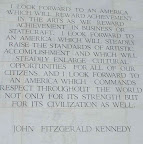A writer is someone who spends years patiently trying to discover the second being inside him, and the world that makes him who he is: when I speak of writing, what comes first to my mind is not a novel, a poem, or literary tradition, it is a person who shuts himself up in a room, sits down at a table, and alone, turns inward; amid its shadows, he builds a new world with words. This man – or this woman – may use a typewriter, profit from the ease of a computer, or write with a pen on paper, as I have done for 30 years. As he writes, he can drink tea or coffee, or smoke cigarettes. From time to time he may rise from his table to look out through the window at the children playing in the street, and, if he is lucky, at trees and a view, or he can gaze out at a black wall. He can write poems, plays, or novels, as I do. All these differences come after the crucial task of sitting down at the table and patiently turning inwards. To write is to turn this inward gaze into words, to study the world into which that person passes when he retires into himself, and to do so with patience, obstinacy, and joy. As I sit at my table, for days, months, years, slowly adding new words to the empty page, I feel as if I am creating a new world, as if I am bringing into being that other person inside me, in the same way someone might build a bridge or a dome, stone by stone. The stones we writers use are words. As we hold them in our hands, sensing the ways in which each of them is connected to the others, looking at them sometimes from afar, sometimes almost caressing them with our fingers and the tips of our pens, weighing them, moving them around, year in and year out, patiently and hopefully, we create new worlds.
The writer's secret is not inspiration – for it is never clear where it comes from – it is his stubbornness, his patience. That lovely Turkish saying – to dig a well with a needle – seems to me to have been said with writers in mind. In the old stories, I love the patience of Ferhat, who digs through mountains for his love – and I understand it, too. In my novel, My Name is Red, when I wrote about the old Persian miniaturists who had drawn the same horse with the same passion for so many years, memorising each stroke, that they could recreate that beautiful horse even with their eyes closed, I knew I was talking about the writing profession, and my own life. If a writer is to tell his own story – tell it slowly, and as if it were a story about other people – if he is to feel the power of the story rise up inside him, if he is to sit down at a table and patiently give himself over to this art – this craft – he must first have been given some hope. The angel of inspiration (who pays regular visits to some and rarely calls on others) favours the hopeful and the confident, and it is when a writer feels most lonely, when he feels most doubtful about his efforts, his dreams, and the value of his writing – when he thinks his story is only his story – it is at such moments that the angel chooses to reveal to him stories, images and dreams that will draw out the world he wishes to build. If I think back on the books to which I have devoted my entire life, I am most surprised by those moments when I have felt as if the sentences, dreams, and pages that have made me so ecstatically happy have not come from my own imagination – that another power has found them and generously presented them to me.
~ Orhan Pamuk
For a deeper understand of Pamuk click here. He was the first Turkish writer to win the Nobel Prize for Literature. A novelist is someone who wants to be alone, and that time is isolation is key to the creative process. Writers can define the human condition better than anyone and with that responsibility comes the necessity to get it right.
Here is an interview Pamuk did with Charlie Rose. The interview starts at 9:20.
Pamuk's official site
